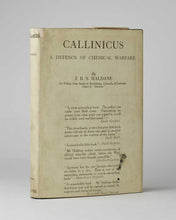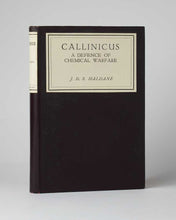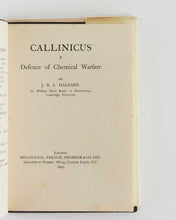
HALDANE, J. B. S. Callinicus. In Defence of Chemical Warfare. London: Kegan Paul~i~. 1925.
Small 8vo. Original publisher's glazed boards with printed labels to front cover and spine, typographical dust-wrapper; pp. [viii, initial blank], 84, [4, blank]; wrapper with one small chip to head of spine and ink spot to front cover, minimal spotting only here and there internally; a very good copy.
Very rare first edition, first printing with the even rarer wrappers of a controversial book by one of the 20th century's great geniuses, polymaths and scientific minds, a cult figure since the 1920s.
John Burdon Sanderson Haldane, without any higher scientific degree, became one of the leading geneticists and lecturers at Cambridge and coined the terms clone and cloning. A public speaker and radical, his influence reached from Aldous Huxley (Brave New World) to science fiction writers such as Arthur C. Clarke, who called Haldane 'perhaps the most brilliant science populariser of his generation'. For others he was simply a phenomenal mind. He was described as 'the last man who might know all there was to be known'.
In this rare work which was reprinted a few times and published in the US as well, he examines the 15 different types of poisonous gas used during the Great War and makes a plea to allow only lachrymatory gases in future wars. In 1907 the international community had ruled out the use of all gases, including tear gas which only incapacitates soldiers for a short period and rarely kills. This little book is a well-researched history of chemical warfare, including Haldane's own experience. Ever the realist he prepares his audience for the likelihood of the use of chemicals in future wars. "I doubt whether objecting to it [war] we are likely to avoid it in the future, however lofty our motives or disinterested our conduct. War will be prevented only by a scientific study of its causes, such as has prevented most epidemic diseases" (p. 3).
SKU: 2121132







